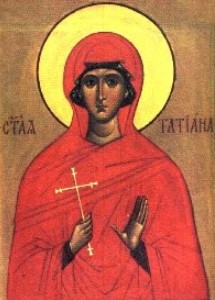Tatiana of Rome
Tatiana of Rome | |
|---|---|
 Russian Orthodox icon of Saint Tatiana, 19th century | |
| Virgin, Martyr | |
| Born | Rome |
| Died | 226–235 Rome |
| Venerated in | Catholic Church Orthodox Church[1] |
| Canonized | Pre-Congregation |
| Major shrine | Cathedral of Saint Demetrius, Craiova, Romania |
| Feast | January 12 |
| Attributes | Shown holding a martyr's cross, or a plate with two eyes on it |
| Patronage | students |
Saint Tatiana was a Christian martyr in 3rd-century Rome during the reign of Emperor Severus Alexander.
Biography
[edit]According to legend, she was the daughter of a Roman civil servant who was secretly Christian, and raised his daughter in the faith. She became a deaconess in one of the Roman churches, tending the sick and helping the needy. One day She was arrested by the jurist Ulpian who attempted to force her to make a sacrifice to Apollo. While she prayed, an earthquake destroyed the Apollo statue and part of the temple.[2]
Tatiana was then blinded, and beaten for two days, before being brought to a circus and thrown into the pit with a hungry lion. But the lion did not touch her and lay at her feet. She was then sentenced to death, and after being tortured, Tatiana was beheaded with a sword on January 12, around AD 225 or 230.[2]
Veneration
[edit]
Tatiana is venerated as a saint, and her feast day is on January 12 (for those churches which follow the traditional Julian Calendar, January 12 currently falls on January 25 of the modern Gregorian Calendar). The miracles performed by Saint Tatiana are said to have converted many people to the fledgling religion. Her skull was translated in 1955 from Bistrița Monastery to the Cathedral of Saint Demetrius in Craiova, Romania, and is enshrined with the relics of Saints Sergius and Bacchus and those of Patriarch Nephon II of Constantinople.[2]
Saint Tatiana is patron saint of students. In Russia and Belarus, Tatiana Day is semi-formally celebrated as "Students' Day."
The similarity of her life with those of Martina and Prisca has led some to question whether they may all be the same person, or if perhaps similar hagiographies were assigned to them posthumously.
References
[edit]- ^ January 25 / January 12. https://www.holytrinityorthodox.com/htc/orthodox-calendar/
- ^ a b c "Martyr Tatiana of Rome, and those who suffered with Her", OCA
- Attwater, Donald and Catherine Rachel John. The Penguin Dictionary of Saints. 3rd edition. New York: Penguin Books, 1993. ISBN 0-14-051312-4.
External links
[edit]- Martyrdom of Saint Tatiana (includes icon)
- The Holy Female Martyr Tatiana Prologue from Ochrid
